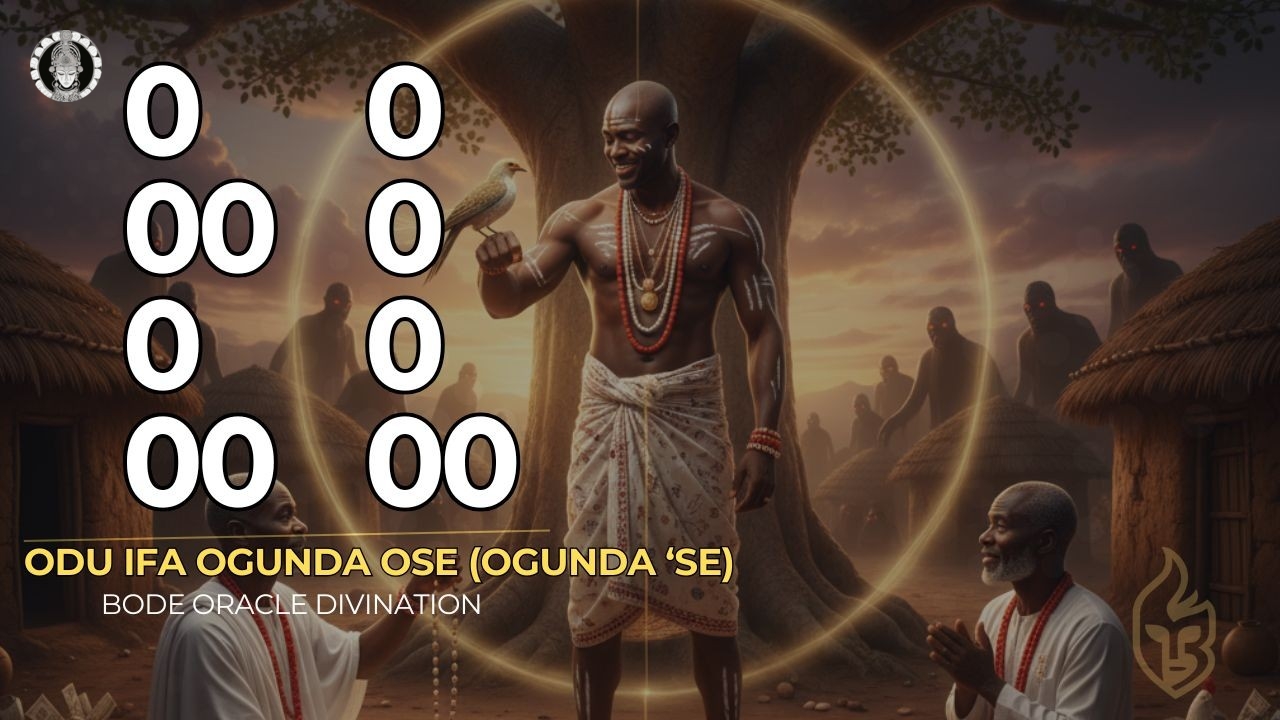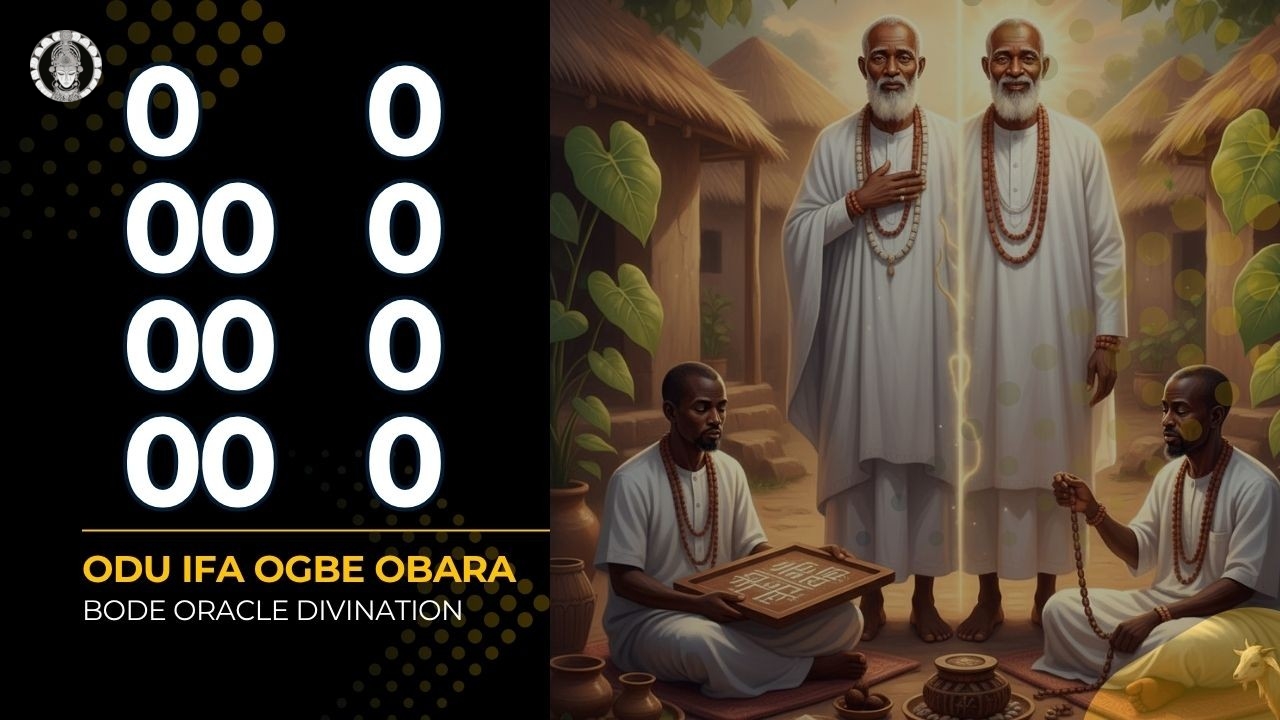Introduction to Odu Ifa Ogbe Obara (Ogbe Bara)
Odu Ifa Ogbe Obara, also known as Ogbe Bara, stands as one of the 256 sacred divination signs in the Ifa corpus, carrying transformative messages about victory, divine favor, longevity, and the life-saving power of obedience. This profound Odu teaches that proper sacrifice and spiritual mediation can transform even divine anger into blessing, that perseverance through struggle leads to triumph over enemies, and that heeding spiritual warnings distinguishes between survival and destruction.
The divinations within Ogbe Obara address fundamental spiritual principles: how to achieve reconciliation when facing overwhelming opposition, how to defeat death itself through faith and sacrifice, why obedience to spiritual guidance is not optional but essential for survival, and how proper ritual intervention brings permanent healing. Each narrative serves as both practical instruction and timeless wisdom, revealing how spiritual law operates in the material world. For comprehensive understanding of the Ifa divination system, explore scholarly documentation of this ancient wisdom tradition.
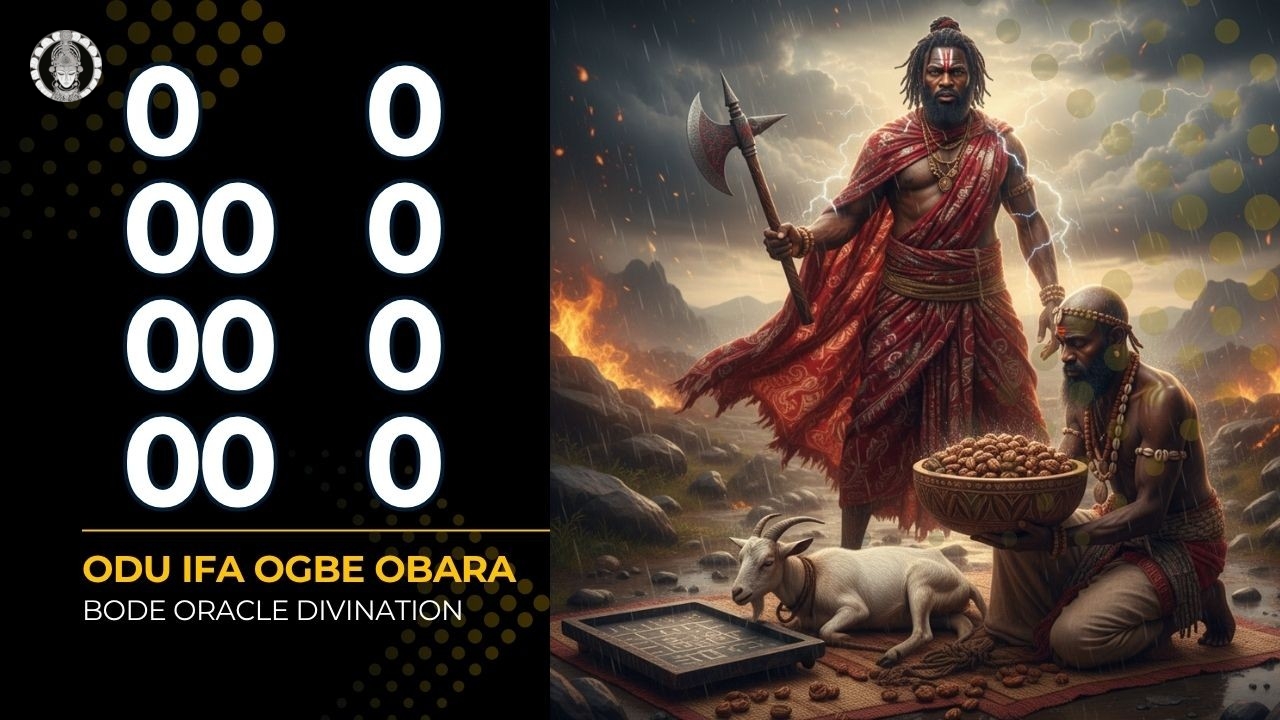
Ifa Divination for Olukoso Arabambi: When Thunder Becomes Gentle Rain
The Power of Divine Anger and Sacred Mediation
This divination from Ogbe Obara reveals one of the most dramatic transformations in the Ifa corpus—the conversion of Sango's destructive fury into life-giving favor. Ifa declares victory and divine favor for those receiving this Odu, promising that through proper sacrifice and wise mediation, even the most terrifying opposition can be transformed into blessing. The story addresses the universal human experience of facing overwhelming force, whether spiritual, social, or circumstantial, and provides the spiritual technology for converting that force from destruction to protection.
Olukoso, the thunder deity also known as Sango, represents the awesome and terrifying aspect of divine power. When his enemies provoked him, he responded with fiery rainstorms that burned rather than nourished. This imagery captures how divine displeasure or the wrath of powerful forces can manifest—not as absence but as presence turned destructive. The enemies found themselves in an impossible situation: they could neither defeat Sango nor survive his continued anger.
The Sacred Verse
Írúlá kò ṣe ọmọ inú ré ṣe pèlé
A d'Ífá fún Olúkóso lá'lú
Arábámbí a fi igba ọta ṣé'gun
Èyí tí yí óó fi àlàpà ṣé'gun ótá ré
L'ójó tí Olúkóso lá'lú ńbínú.
Írúlá kó ṣe ọmọ inu rè ṣe pèlé
A d'Ífá fún Ogbè
L'ọjọ tí ó ńlọ rèé bẹ àrírá
English Translation
Irula was not gentle with her child
This was the Ifá cast for Sango,
The god of thunder, who uses 200 enemies to gain victory,
Who will overcome his enemies with great strength,
On the day Olúkóso was in anger.
Irula was not gentle with her child
This was the Ifá cast for Ogbe,
On the day they were going to beg for mercy.
The Spiritual Technology of Reconciliation
The enemies' decision to seek Orunmila's mediation demonstrates profound spiritual wisdom. They recognized that direct approach to an angry deity would result in destruction, but approach through the proper spiritual authority—Orunmila, the witness of destiny—could create a pathway to reconciliation. This establishes a crucial principle: there are spiritual protocols for every situation, and knowing them can mean the difference between annihilation and salvation.
The Transformative Power of Bitter Kola
The offering of 200 bitter kola nuts carries deep symbolic and practical significance. In Yoruba spiritual culture, bitter kola (orogbo) represents respect, humility, and sincere communication. The number 200 indicates completeness and abundance—this was not a token gesture but a comprehensive offering acknowledging the full weight of their offense. The bitter taste of the kola symbolizes acceptance of consequences, while its presentation through proper channels demonstrates submission to spiritual order. When Sango saw these offerings, presented properly through Orunmila, his heart immediately softened.
The Meteorological Miracle
The transformation of the rain from scorching to gentle serves as physical confirmation of spiritual transformation. Before the sacrifice, the rain burned—it was Sango's anger made manifest. After proper mediation and offering, the same rain became cool and nourishing. This teaches that circumstances themselves don't always need to change; sometimes what changes is their quality and effect. The storm that threatened to destroy became the blessing that refreshed. Learn more about UNESCO's recognition of the Ifa divination system as intangible cultural heritage.
Orunmila as the Voice of Wisdom
Orunmila's successful mediation reveals his unique position in Yoruba cosmology. Even the powerful Orisha Sango respects the wisdom of Ifa. This teaches that raw power must ultimately yield to wisdom, that force without understanding leads to destruction, while wisdom creates pathways even through impossible situations. Those who align with Orunmila's wisdom gain access to solutions that force alone cannot achieve.
Prescribed Offerings (Ebo)
For transformation of anger into favor and victory over enemies, Ifa prescribes 200 bitter kola nuts (igba orogbo) and a male goat (obuko). The bitter kola represents sincere communication and respect, while the goat symbolizes substitution and strength. These offerings, properly presented through a qualified Babalawo, invoke the spiritual principle of transformation demonstrated in Sango's story.
Modern Application
In contemporary life, this divination speaks to situations where we face overwhelming opposition—whether from authorities, circumstances, or spiritual forces. It teaches that proper mediation through qualified spiritual practitioners, combined with sincere offerings, can transform even the most hostile situations. The principle applies to legal disputes, workplace conflicts, family estrangements, and any circumstance where direct confrontation would lead to destruction but proper spiritual approach can create reconciliation.
Ifa Divination for Aagberi: The Chameleon Who Refused to Die
Victory Through Spiritual Resilience
This divination from Ogbe Obara addresses the terrifying experience of being surrounded by enemies while simultaneously fighting illness that seems destined to claim one's life. Ifa declares longevity and complete victory over adversaries for those receiving this Odu, revealing that through prescribed sacrifice and unwavering faith, one can survive circumstances that should result in death. The story of Aagberi the Chameleon demonstrates that spiritual protection can reverse even the most dire predictions.
The chameleon holds special significance in Yoruba cosmology as a creature of patience, adaptation, and survival. Unlike aggressive predators, the chameleon survives through awareness, strategic movement, and the ability to blend with its environment. These qualities make it the perfect protagonist for a story about surviving overwhelming odds through spiritual rather than physical strength.
The Sacred Verse
Ogbè bàràbàrà làá n g'ẹtì
Ṣóńṣó orí ẹ l'òógùn
A d'Ífá fún Àágbérí ọga
ọmọ akan'run ma yùn-ún
ọmọ akan'run ma lọ
ọmọ akan'lẹkùn òrun gbọn-gbọn-gbọn má rè
l'ójó ti wón ńránṣé ìkú pé e l'órun
English Translation
Ogbe says we climb the hill with struggle,
On the top of the nose is sweat,
This was the Ifá cast for Àágbérí, the Chameleon,
The one who got sick but is not sick,
The one who got sick but won't die,
The one who knocks fiercely on the door of heaven,
On the day death was calling him to heaven.
The Metaphor of Climbing with Sweat
The opening verse acknowledges an essential truth: victory is not effortless. The image of climbing a hill with struggle, sweat visible on one's face, represents the reality of life's challenges. This honesty distinguishes genuine spiritual wisdom from false promises. Ifa does not claim to remove all difficulty; rather, it provides the spiritual resources to persevere through difficulty until victory is achieved. The sweat represents honest effort combined with spiritual support—neither works alone, but together they accomplish what seems impossible.
The Paradox of Being Sick But Not Sick
Aagberi's description as "one who got sick but is not sick" reveals profound spiritual truth about the relationship between physical circumstances and spiritual reality. In the material realm, Aagberi appeared mortally ill, surrounded by enemies plotting his demise. In the spiritual realm, protected by proper sacrifice, he remained untouchable. This paradox teaches that ultimate reality is spiritual, not material. What appears to be happening may not be what is actually happening when spiritual intervention has occurred.
Knocking on Heaven's Door Without Entering
The imagery of knocking fiercely on heaven's door but refusing to enter demonstrates the tension between physical vulnerability and spiritual protection. Death called, circumstances suggested the end was near, yet Aagberi persisted in the realm of the living. This teaches that determination combined with proper spiritual support can literally keep one in life when death seems certain. The "fierce knocking" represents the intensity of the challenge, while the refusal to enter represents the power of sacrifice and faith.
The Reversal of Fate
The most dramatic element of this divination is the complete reversal: instead of Aagberi dying, his enemies perished. This demonstrates Ifa's principle that proper sacrifice does not merely protect—it can reverse the intended outcome entirely. Those who plotted destruction experienced it themselves, while their intended victim lived to praise Ifa. This serves as both comfort and warning: spiritual law operates impartially, blessing those who comply and allowing consequences to those who oppose.
Prescribed Offerings (Ebo)
For victory over enemies and protection from death, Ifa prescribes sacrifice as revealed through proper divination. The specific offerings vary according to individual circumstances but follow the pattern established by Aagberi: complete compliance with what Ifa prescribes, regardless of how circumstances appear. For deeper understanding of Yoruba spiritual cosmology, consult scholarly resources on African Traditional Religions and Ifa.
The Promise of This Divination
Ifa explicitly declares that it will not allow enemies' hands to overpower those who receive Ogbe Obara in divination. This is not conditional on the person's strength, intelligence, or resources—it is conditional only on proper sacrifice and faith. The divination promises that when spiritual obligations are fulfilled, physical circumstances must align with spiritual protection, regardless of how impossible victory appears.
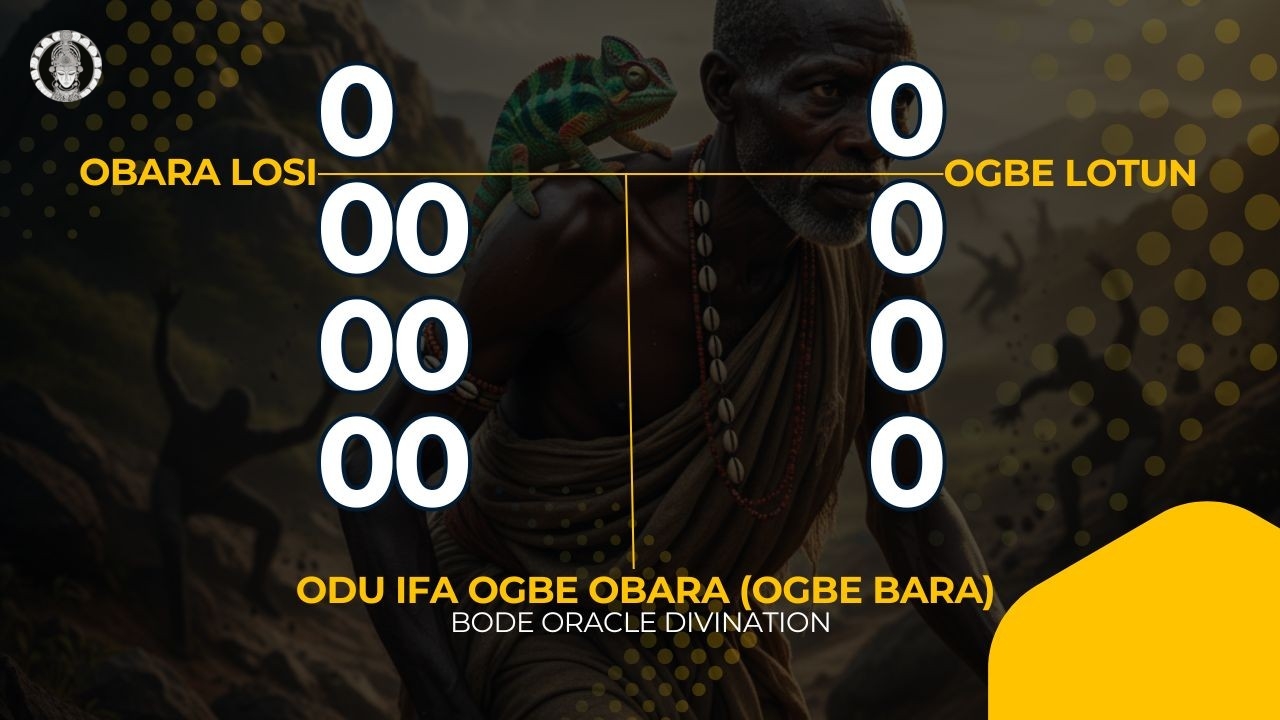
Ifa Divination for the Snail, Rat, and Snake: The Wisdom of Obedience
When Warning Becomes the Difference Between Life and Death
This divination from Ogbe Obara delivers one of the most direct and uncompromising messages in the Ifa corpus: obedience to spiritual warnings is not optional—it is the difference between survival and destruction. Ifa declares longevity for those receiving this Odu but issues stern warnings that disobedience and dismissiveness will lead to catastrophe. The story of three animals sharing the same space, receiving the same warning, yet experiencing vastly different outcomes based solely on their response, serves as an eternal lesson about the consequences of spiritual choices.
The setting beneath the Afon tree represents any place of comfort or security where we build our lives—our homes, careers, relationships, or routines. The tree provides shade and shelter, creating an illusion of permanent safety. However, spiritual warnings reveal that what appears secure may be vulnerable to forces we cannot control through physical means alone.
The Sacred Verse
Òpìpí yé díè díè kí o lè baa r'ápá bo eyin
A d'Ífá fún eku
Tí ńjẹ ní mórín àfọn
Òpìpí yé díè díè kí o lè baa r'ápá bo eyin
A d'Ífá fún ejò
Tí ńjẹ ní mórín àfọn
Òpìpí yé díè díè kí o lè baa r'ápá bo eyin
A d'Ífá fún ìgbín
Tí ńjẹ ní mórín àfọn
English Translation
Opipi chicken lays small eggs so she can protect them.
Ifá was cast for the rat,
Who was eating beneath the Afon tree.
Opipi chicken lays small eggs so she can protect them.
Ifá was cast for the snake,
Who was eating beneath the Afon tree.
Opipi chicken lays small eggs so she can protect them.
Ifá was cast for the snail,
Who was eating beneath the Afon tree.
The Democratic Nature of Warning
All three animals received identical warnings about impending danger. Death was coming, and they needed to sacrifice for protection. This establishes a crucial principle: spiritual guidance is available to all equally. Ifa does not withhold warnings from some while favoring others. The opportunity for survival was presented fairly to each creature. What differed was not the message or the messenger, but the recipients' responses to identical information.
The False Security of the Tree
The animals lived beneath the Afon tree, which provided them shade, shelter, and feeding grounds. When warned about danger, the Rat and Snake likely reasoned that the tree had always protected them before—why should now be different? This represents the dangerous human tendency to trust past security as guarantee of future safety. The tree symbolizes any circumstance we rely upon: stable employment, good health, established relationships, or peaceful conditions. Spiritual warning reveals that these securities can become instruments of destruction if we fail to take protective action.
The Psychology of Dismissal
Why did the Rat and Snake refuse to sacrifice while the Snail obeyed? Several factors likely influenced their decision: they may have felt the warning was exaggerated or unlikely, they may have trusted their own assessment of safety over spiritual guidance, or they may have considered the sacrifice too costly compared to the perceived risk. These same psychological patterns cause humans to dismiss spiritual warnings—we calculate based on physical probability rather than spiritual certainty, and we often regret it too late.
The Snail's Wisdom: Action Over Analysis
The Snail's response demonstrates profound wisdom: when spiritual guidance is given, compliance is more important than understanding. The Snail did not demand proof of the danger or negotiate about the sacrifice. It simply obeyed, burying itself beneath the earth for protection. This action, which might have seemed excessive or paranoid to observers, proved to be precisely correct when the storm came and the tree fell.
The Storm and the Collapse
When the storm arrived, it brought strong winds that toppled the Afon tree. The very shelter that had protected the animals became their tomb—the Rat and Snake were crushed in their homes. Meanwhile, the Snail, safely buried beneath the earth, survived unharmed. This dramatic reversal teaches that proper spiritual preparation transforms vulnerability into security, while false security without spiritual preparation becomes deadly.
The Proverb of Warning
From this event came the enduring Yoruba saying: "Beware, for the tree may not be able to withstand the coming storm." This proverb serves as perpetual reminder that external circumstances, no matter how solid they appear, require spiritual reinforcement. It warns against complacency and overconfidence in material securities. For scholarly perspectives on Yoruba wisdom traditions, explore research on Ifa as an artistic expression of knowledge creation.
Prescribed Offerings (Ebo)
For protection from impending danger and to ensure survival when warnings are given, Ifa prescribes immediate sacrifice as revealed through divination. The specific offerings depend on the nature of the threat, but the pattern is clear: prompt obedience to spiritual guidance, without argument or delay, is itself a form of sacrifice that attracts protection.
Modern Application and Behavioral Guidance
This divination instructs those receiving Ogbe Obara to never dismiss spiritual warnings, never rely solely on physical securities without spiritual reinforcement, never engage in arguments or fighting when warned against conflict, and always act immediately on spiritual guidance rather than analyzing or delaying. The Odu emphasizes that intellectual understanding is less important than prompt obedience—the Snail may not have understood why it needed to bury itself, but its survival proved the wisdom of compliance.
Ifa Divination for Ajidewe Edu: Orunmila's Victory Over Illness
When Illness Tests the Teacher of Wisdom
This divination from Ogbe Obara reveals a profound truth: even Orunmila himself, the embodiment of wisdom and spiritual knowledge, required Ifa's guidance when facing illness. Ajidewe Edu is another name for Orunmila, and this story demonstrates that spiritual authority does not provide automatic immunity from life's challenges. However, it does provide the knowledge and discipline to address those challenges correctly. The message for those receiving this Odu is clear: illness can be permanently overcome through proper sacrifice, and neglecting spiritual intervention when health is compromised leads to continued suffering.
The fact that this divination features Orunmila himself serves multiple purposes: it validates the experience of illness without shame (even the greatest can experience physical affliction), it demonstrates that the prescribed solution works (if it healed Orunmila, it can heal anyone), and it teaches that spiritual knowledge must be personally applied, not merely intellectually understood.
The Sacred Verse
Àṣèṣè yọ òdúndún
Níí f'ara jọ etí adétè
A d'Ífá fún àjídèwe Èdú
Ájídèwe Èdú ni à ńpe Òrúnmìlà.
English Translation
The bloom of the Odundun tree
Resembles the ear of a leper.
Ifá was cast for Ajidewe Edu,
Ajidewe Edu is another name for Òrúnmìlà.
The Symbolism of the Odundun Bloom
The comparison between the Odundun tree's bloom and a leper's ear serves as vivid imagery for affliction and its appearance. Leprosy in Yoruba tradition represents not just physical disease but spiritual imbalance requiring intervention beyond physical medicine. The verse suggests that what appeared on Orunmila was concerning enough to require immediate spiritual attention—a condition that looked like serious illness requiring more than ordinary treatment.
The Paradox of the Healer Requiring Healing
Orunmila's experience of physical discomfort and need for divination reveals an important spiritual principle: knowledge of the path does not exempt one from walking it. Even the one who teaches others about sacrifice must perform sacrifice for himself. This demolishes any notion that spiritual advancement provides automatic protection from life's challenges. Instead, it provides the wisdom to address those challenges correctly when they arise.
The Pattern of Healing
Orunmila's healing followed a precise pattern that serves as template for all healing under this Odu: recognition of the problem (physical discomfort), consultation with Ifa (seeking spiritual guidance), revelation of solution (sacrifice prescribed), compliance with prescription (offering performed), and complete resolution (never afflicted again). This pattern emphasizes that healing is a process requiring each step to be completed properly.
The Permanence of Ifa's Healing
The divination explicitly states that after performing the sacrifice, Orunmila "never suffered illness again." This promise of permanent healing distinguishes spiritual intervention from physical treatment that may provide temporary relief but requires repeated application. When Ifa's prescription is properly followed, the root spiritual cause of illness is addressed, not merely its physical symptoms. This does not mean believers never experience any physical discomfort, but rather that when they maintain proper spiritual practice, chronic or life-threatening illness is prevented.
The Warning Against Neglect
The instruction that recipients of this Odu "must not neglect their offering" carries serious weight. If even Orunmila required sacrifice for healing, no one can assume their spiritual practice is strong enough to overcome illness without proper ritual intervention. Neglect is specifically mentioned because there is a tendency to delay or dismiss spiritual solutions when we're already pursuing medical treatment. Ifa teaches that both are necessary—physical medicine for the body, spiritual sacrifice for the root cause.
Prescribed Offerings (Ebo)
For healing from illness and prevention of future affliction, Ifa prescribes sacrifice as revealed through proper divination. While specific items vary by individual circumstance, the principle remains constant: illness under Ogbe Obara requires spiritual intervention that must not be neglected or delayed. The sacrifice addresses the spiritual dimension that physical medicine cannot reach.
Orunmila's Praise of Olodumare
After his healing, Orunmila praised Olodumare, the Sovereign of the heavens. This demonstrates proper spiritual protocol: when blessings come through Ifa's prescription, the ultimate source of all blessing—Olodumare—receives acknowledgment. This gratitude completes the spiritual circuit and maintains proper relationship with divine forces. Those healed through this Odu should follow Orunmila's example of grateful acknowledgment.
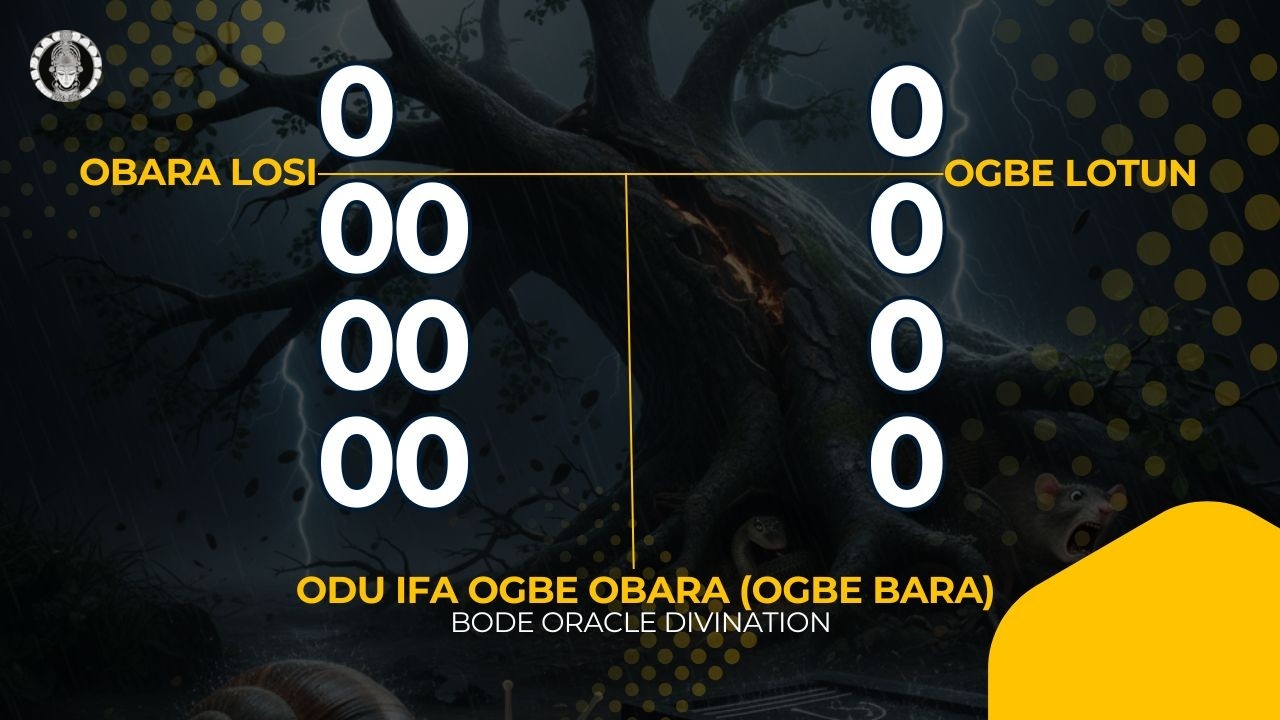
Spiritual Lessons and Practical Guidance from Ogbe Obara
The Transformative Power of Proper Mediation
Across all the divinations within Ogbe Obara, we see the critical importance of proper spiritual mediation. Just as Orunmila successfully mediated between Sango and his enemies, qualified spiritual practitioners serve as essential bridges between human need and divine solution. This teaches that attempting to navigate serious spiritual challenges without proper guidance is like the enemies trying to approach angry Sango directly—the outcome is predictable and unfortunate. Wisdom lies in recognizing when we need mediation and seeking it from qualified sources.
The Non-Negotiable Nature of Obedience
The contrast between the Snail's survival and the Rat and Snake's death eliminates any ambiguity about the importance of obedience. Spiritual warnings are not suggestions to be weighed against our own assessment—they are urgent guidance that determines survival. Modern practitioners receiving Ogbe Obara must internalize this lesson: when Ifa prescribes sacrifice or behavioral changes, compliance is not optional. The intellectual tendency to analyze, question, or delay spiritual guidance can be as fatal as outright refusal.
Victory Through Perseverance
Aagberi's story of climbing the hill with sweat on his face, knocking on heaven's door but refusing to enter, teaches that victory often requires sustained effort through difficulty. Spiritual protection does not usually manifest as the absence of challenge but as the strength to endure until breakthrough arrives. Those receiving this Odu should expect struggle but trust that proper sacrifice combined with persistent faith will result in complete victory over enemies and circumstances.
The Integration of Physical and Spiritual Solutions
While Ogbe Obara emphasizes spiritual intervention, it does not dismiss physical effort. Orunmila experienced physical discomfort and sought spiritual solution, but he also took action (performing sacrifice). The Snail heard the warning and took physical action (burying itself). This integration of spiritual practice with practical action represents the balanced approach Ifa teaches. We do not ignore physical realities in favor of only spiritual work, nor do we rely solely on physical solutions while neglecting spiritual dimensions.
The Principle of Transformation Over Elimination
Notice that in Sango's story, the rain did not stop—it transformed from burning to cooling. This teaches that Ifa's solutions often work by transforming circumstances rather than eliminating them entirely. Challenges may remain, but their quality and effect change completely. What threatened to destroy becomes what blesses. This principle helps us maintain faith even when difficult circumstances persist—we wait not for their disappearance but for their transformation through proper spiritual work.
Behavioral Warnings for Recipients of Ogbe Obara
Those receiving this Odu must observe specific behavioral guidelines: avoid physical fighting and quarrels (the Odu promises victory through spiritual means, not physical confrontation), never dismiss or delay when warnings are given (the Rat and Snake's fate serves as eternal reminder), do not neglect sacrifices for health (even Orunmila required spiritual intervention for healing), seek proper mediation rather than direct confrontation in conflicts (Sango's enemies survived by approaching through Orunmila), and maintain patience through difficulty while trusting the process (Aagberi's perseverance resulted in complete victory).
The Promise of Complete Victory
Ifa's declaration that it will not allow enemies to overpower recipients of Ogbe Obara is absolute, not conditional on the person's natural strength or resources. This promise depends solely on proper compliance with spiritual prescriptions. The divination promises not just survival but complete reversal—enemies who plot destruction experience it themselves, illness is permanently healed, anger transforms into favor, and those marked for death live to praise Ifa. This comprehensive victory comes to those who combine faith with obedience. For additional insights into Yoruba spiritual systems, explore UNESCO documentation on Ifa of the Yoruba people.
Additional Resources
Internal Links
- Complete Guide to Ogbe Obara - Detailed information, taboos, and practices
- Ogbe Obara Blog Post - Extended teachings and commentary
- Bode.ng Blog - Extensive collection of Ifa and Yoruba spirituality articles
- Complete Odu Ifa Directory - Explore all 256 sacred signs
- Bode.ng - Access divination services and community resources
External Resources
- African Traditional Religions: Ifa Divination - Duquesne University
- Ifa Divination System - Wikipedia
- UNESCO Recognition of Ifa Divination System
- Ifa of the Yoruba People of Nigeria - UNESCO Archives
- Ifa Divination System: An Artistic Expression of Yoruba Knowledge Creation
- Algebraic Characterization of Ifa Main Divination Codes - ScienceDirect
Connect With Us on Social Media
- BODE Oracle on TikTok - Daily wisdom and divination insights
- BODE Oracle on YouTube - In-depth teachings and ceremonies
- BODE Oracle on Facebook - Community discussions and updates
- BODE Oracle on X (Twitter) - Quick wisdom and announcements
- BODE Oracle on Pinterest - Visual spiritual inspiration
Visit Bode.ng to explore more divination teachings, participate in quizzes and polls, and connect with our community of practitioners and learners. Register today to access exclusive content and personalized guidance on your spiritual journey. Our platform offers comprehensive resources for both traditional practitioners and those newly discovering the wisdom of Ifa.
Frequently Asked Questions About Odu Ifa Ogbe Obara (Ogbe Bara)
Find answers to common questions about this sacred Odu Ifa and its transformative teachings
Ogbe Obara, also called Ogbe Bara, is one of the 256 sacred Odu in the Ifa corpus. It carries powerful messages about achieving victory over enemies, receiving divine favor, attaining longevity, and the critical importance of obedience to spiritual guidance. This Odu teaches that through proper sacrifice and heeding warnings, one can transform anger into favor, overcome death predictions, and survive challenges that destroy others.
The divination of Olukoso (Sango) demonstrates how proper mediation and sacrifice can transform divine anger into blessing. When Sango's enemies brought 200 bitter kola nuts and a goat through Orunmila's intercession, Sango's fury subsided. The scorching rain became gentle and cool, symbolizing the transformation from wrath to favor. This teaches that even when facing overwhelming opposition or divine displeasure, the right offerings and proper mediation can reverse the situation completely.
The divination of Aagberi the Chameleon teaches profound lessons about spiritual resilience and victory over death. Despite being surrounded by enemies and knocking on heaven's door with illness, Aagberi refused to die. Through prescribed sacrifices, his enemies perished instead of him. The phrase 'climbed the hill with struggle, sweat on the nose' represents perseverance through difficulty. This story promises that Ifa will not allow enemies to overpower those who maintain faith and perform proper sacrifices.
The story of the Snail, Rat, and Snake powerfully illustrates the life-or-death consequences of obedience. All three were warned about impending danger beneath the Afon tree and told to sacrifice. Only the Snail obeyed, burying itself for protection. When the tree collapsed during a storm, it killed the Rat and Snake who dismissed the warning, but the Snail survived. This teaches that spiritual warnings are not suggestions but urgent guidance that determines survival or destruction.
In the Olukoso divination, 200 bitter kola nuts (orogbo) served as the key offering that transformed Sango's anger into favor. Bitter kola holds deep spiritual significance in Yoruba tradition as a symbol of respect, reconciliation, and spiritual communication. The number 200 represents completeness and abundance in Yoruba numerology. When Sango saw the bitter kola, his heart immediately softened, demonstrating how proper offerings, presented with sincerity, can change even the most difficult circumstances.
The divination for Ajidewe Edu (another name for Orunmila) reveals that when illness afflicts someone receiving this Odu, they must not neglect the prescribed sacrifice. Orunmila himself experienced physical discomfort, consulted Ifa, performed the required offerings, and never suffered illness again. This establishes the principle that health challenges under Ogbe Obara are spiritual tests that require ritual intervention, not just physical treatment. Compliance with Ifa's prescription brings permanent healing.
The phrase 'Ogbe says we climb the hill with struggle, on the top of the nose is sweat' from Aagberi's divination represents the inevitable difficulties of life's journey. The hill symbolizes obstacles and challenges; the sweat represents honest effort and perseverance. This imagery acknowledges that victory is not easy or automatic—it requires struggle, determination, and spiritual support. However, those who persist while maintaining proper spiritual practice will reach the summit and overcome their adversaries.
The Afon tree that sheltered the Snail, Rat, and Snake represents false security—things we trust for protection that can become instruments of destruction. When the storm came, the very tree that provided shade became deadly. This teaches that physical securities without spiritual preparation are dangerous. The Snail survived not by trusting the tree but by heeding spiritual warning and taking protective action. It warns against complacency and overconfidence in material circumstances.
Orunmila's role as mediator between Sango and his enemies demonstrates the power of proper intercession. The enemies could not approach Sango directly in his anger—they needed someone with spiritual authority and wisdom to present their case properly. This teaches that in situations of conflict or divine displeasure, proper mediation through qualified spiritual practitioners, combined with appropriate offerings, can achieve reconciliation that direct confrontation cannot. It also shows Orunmila's unique position as the voice of wisdom that even Orishas respect.
Ogbe Obara provides clear behavioral instructions: do not be disobedient when spiritual guidance is given, do not engage in quarrels or fighting, do not dismiss warnings even if they seem unlikely, and do not neglect sacrifices for health. The Odu emphasizes that knowledge without action is worthless—the Rat and Snake knew about the danger but died because they didn't act. Those receiving this Odu must combine spiritual awareness with prompt obedience to survive and thrive.
You can explore comprehensive information about Ogunda Irete through several resources:
- Complete Guide to Ogunda Irete - Detailed taboos and practices
- Ogunda Irete Blog Post
- Bode.ng Blog - Extensive articles on Ifa spirituality
- Complete Odu Ifa Directory
- Bode.ng - Access divination services and community resources
Connect with us on social media for regular teachings: TikTok, YouTube, Facebook, X (Twitter), and Pinterest @BODEOracle.
